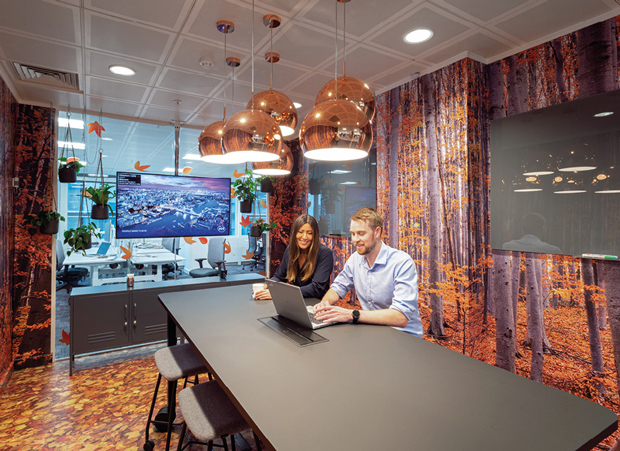WORTH THE COMMUTE?
When contemplating the future of the workplace, Benison believes the industry doesn’t yet have the magic answer to the challenges of changed working patterns, but it is making progress. She’s keen to use its showcase HQ in Canary Wharf as a test bed on ways of attracting people back into the workplace. This included the creation of an optimised workspace with a 40 per cent desk reduction, and an increase in meeting and collaboration space of 90 per cent. Along with a more sustainable environment, a series of themed events, such as wellbeing, learning, charity and inclusion have been introduced and the Group is utilising the latest workplace technology including an ISS Workplace Experience App.
“The prize is, all these initiatives can be data driven,” says Benison. “IOT data can tell us for instance when too few people are utilising a particular space and we can then come up with proposals on what can be done with it, from mothballing to repurposing it. For some of our customers we’ve also installed ‘floor hosts’ who examine the different ways spaces are being used and advise the customer on what’s working and what is not.
“The combination of the data and the tech is allowing us to put options to customers, which range from very easy to do and fairly low impact, all the way through to some quite difficult decisions. Most clients are shying away from controversial changes but as we’re renewing contracts we’re ensuring agility for the future.
“We are on the cusp of the workforce changing, it’s becoming a majority millennial workforce, and we will have to be agile as we move through these generational shifts.”
PEOPLE-LED BUSINESS
FM is primarily a people-led business, and within the sector there is a growing concern in ensuring there is the right talent for the job, from front line operatives to the next generation of management.
Says Benison: “Like the rest of the industry we’re having to work a lot harder to recruit. This is why we’re a doing complete revamp on the way we hire our ‘placemakers’ and how they are onboarded.
“ISS is looking at a range of innovations, including a programme that brings people in from the military for their first role in civilian life. We also aim to be more efficient in getting job offers in and aim to onboard new recruits as quickly as possible, from getting them the tech and uniforms they require, to streamlining right to work checks.”
When it comes to job progression says Benison: “We’ve got to make it easy to progress for those that want it and always treat our people with dignity, which means being paid correctly and on time. We’re also introducing initiatives like financial wellbeing programmes, for if we can equip people with information on how they’re being paid, what this deduction is and so on, they can then make more informed choices.”
On the management side, ISS is going through a transformation process with its back office and has hired some new talent from the competition and from outside the sector. Along with the refurbished London offices the group has also invested in its Stoke and Bolton workspaces which offer flexible, sustainable spaces that promote wellbeing.
Says Benison: “We know the workplace is important to our people as well. The power of ISS is that we’ve 350,000 people working across sectors and around the world and if they interact with 10 people on a daily basis, and we can make any of those interactions intentional, then the reach that we have is immense.
“As an example, one of our floor hosts in professional services, noticed a partner throwing her coffee cup into the wrong bin. The placemaker has a decision to make, does she just wait until the partner’s left or challenge her, which she did so in a lovely way. The partner asked her to come in and talk to her leadership team on supporting sustainability both at work and at home. Encouraging 350,000 people to do this every day is the mission we’re on.”
DRIVING CHANGE IN FM
Moving into the FM sector in 2021, Benison witnessed the important role it took during the pandemic, where ISS was intrinsic to the setting up of the Nightingale Hospitals. She believes FM has a window of opportunity in utilising its higher profile. Hailing from a consultancy background she also pinpoints FM’s USP.
“Advisory companies can’t effect change but FM can bring ideas to life. We have an advisory offering around energy management for example, and can tap into the building management systems of an estate and give advice on the ways that an organisation could save money on energy.
“Customers will value that but the unique bit is that we can then make it happen for them as well, through our skilled engineers ensuring all the infrastructure of the building is tuned to deliver on that strategy. We can then refer to our placemakers who are on the ground and can see if despite all the fancy stuff being done there is still a guy who keeps opening his window.
“This means we’re in on the thought leadership process from the beginning and all the way through. That to me is what is exciting about this sector because on the really big agenda topics like diversity and inclusion, to sustainability I think we’re almost uniquely positioned to make a difference.
“FM has been too subservient before and grateful to be included in big conversations and what I’m hearing now is ‘pull up to the table beside us and give us your ideas’.”





